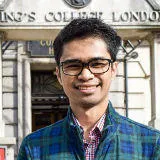
Biography
Yangki Imade Suara is a PhD student in the Department of International Development. His research focuses on the inequality of education in emerging economies with a focus on Indonesia.
He has a MSc in Emerging Economies and Inclusive Development from King’s College London. His doctoral research was funded by the Government of Indonesia under the Indonesian Education Scholarship (Beasiswa Pendidikan Indonesia – BPI).
He also has a MA in Emerging Economies and Inclusive Development from King’s College London and a BA in Economics and Development Studies from Padjadjaran University. He is an alumnus of Study of the United States Institute (SUSI) on Energy and Environment, sponsored by Department of States.
Prior to joining King’s, he worked as a researcher at the Center for Sustainable Development Goals Studies, Padjadjaran University (SDGs Center Unpad) and Center for Economics and Development Studies, Padjadjaran University (CEDS Unpad). In 2015-16, he worked at the Country Programming Division of the Green Climate Fund (GCF) in South Korea, specialising in the development of country programming databases for the 2015 United Nations Climate Change Conference (COP 21).
He has consulted for the Asian Development Bank (ADB), Japan International Cooperation Agency (JICA), Ministry of Finance Indonesia (MoF) and the National Development Planning Agency (BAPPENAS).
Research
Thesis title: 'Educational inequality in the era of educational expansion: a case study of Indonesia'
PhD supervision
- Principal supervisor: Andy Sumner
- Secondary supervisor: Eduardo Gomez
Further details
Research

Poverty, Inequality & Inclusive Growth research group
Exploring the causes of poverty in emerging economies and the factors that prevent people from escaping it, including who remains vulnerable to economic slow-downs.
Research

Poverty, Inequality & Inclusive Growth research group
Exploring the causes of poverty in emerging economies and the factors that prevent people from escaping it, including who remains vulnerable to economic slow-downs.
